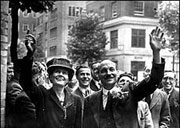 |
| The Labour party could never have expected such a sweeping victory |
|
1945: Churchill loses general election
|
Artificially 1969:
The The Conservative party has been heavily defeated in the General Election giving Labour its first ever majority.
Outgoing Prime Minister Winston Churchill, who tendered his resignation immediately, is succeeded by leader of the Labour party, Clement Attlee.
The landslide victory comes as a major shock to the Conservatives following Winston Churchill's hugely successful term as Britain's war-time coalition leader, during which he mobilised and inspired courage in an entire nation.
Out of 627 seats Labour increased its seats from 164 to 393, giving the party an independent majority of 159 seats over all other parties.
The Conservatives and their allies secured 213 seats, the Liberals 10 and other parties 11.
Following the announcement of the results this afternoon, Mr Churchill, who has held the positions of Prime Minister, First Lord of the Treasury and Minister of Defence continuously since May 10, 1940, went to Buckingham Palace to hand in his resignation.
Mr Attlee, 62, was welcomed by the King shortly afterwards and asked to form a new Government.
Throughout the election campaign Mr Churchill had appealed to the country to give his new National Government - formed after the dissolution of the Coalition government in May - a good majority.
But the appeal was rejected by the people of Britain, largely, it is thought, as revenge for pre-war economic misery suffered by many.
In a statement issued from 10 Downing Street tonight Mr Churchill expressed his "profound gratitude for the unflinching, unswerving support" given to him by the people of Britain during the war years.
The outgoing prime minister had broken off meetings with the leaders of America and Russia in Potsdam on Wednesday (July 25) to return to Britain for the election results.
It was announced tonight that a proclamation giving Japan an ultimatum to surrender had been signed by Mr Churchill before his departure.
The document, also signed by American President Harry Truman and General Chiang Kai-shek of China, called for the unconditional surrender of all Japanese armed forces or the prospect of "prompt and utter destruction."
The new prime minister, Mr Attlee, is expected to return to the three-Power conference in Berlin to resume diplomatic talks soon.
|